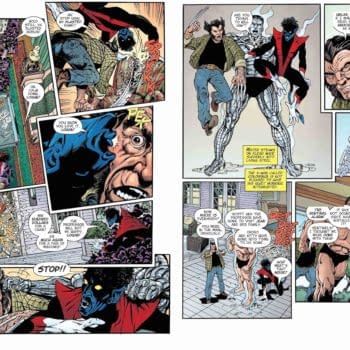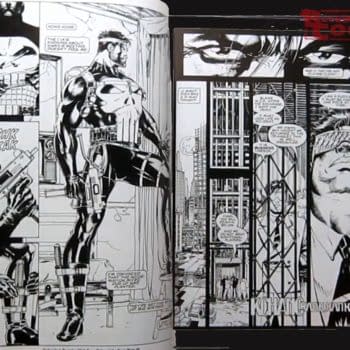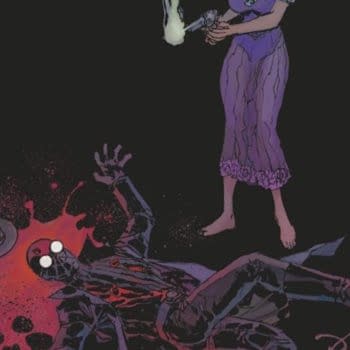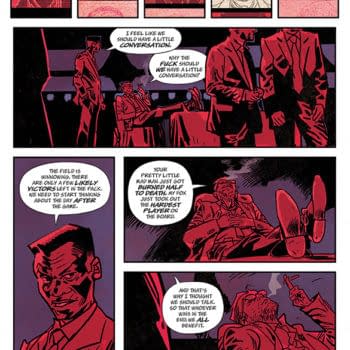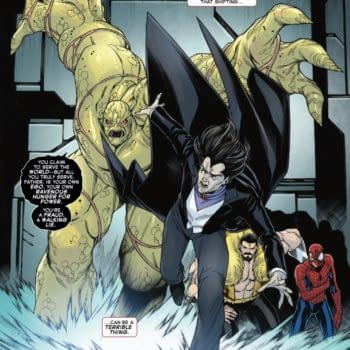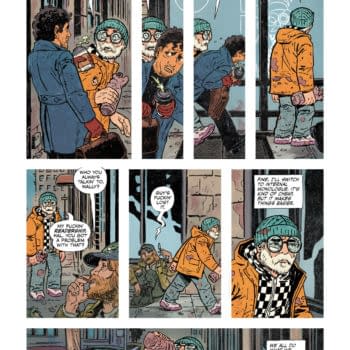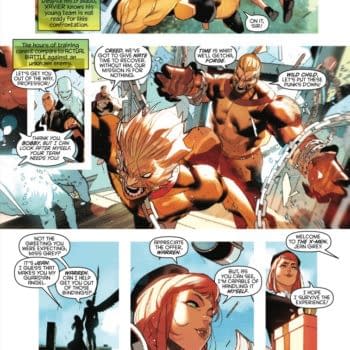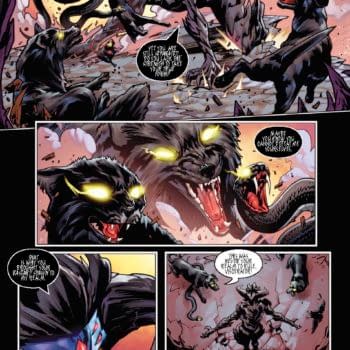Posted in: Comics | Tagged: ales kot, Comics, entertainment, wolf
Wolf: Ales Kot Infuses The Political In Supernatural Thriller – Look! It Moves! by Adi Tantimedh
Adi Tantimedh writes,
A burning man walks down the Hollywood Hills, delirious, singing.
This man is Wolf, a paranormal investigator who can't die. He would very much like to.
He moves in a Los Angeles of supernatural creatures: werewolves, vampires, Cthulu, demons and ghosts, but the worst monsters are still humans.
This is Los Angeles as a landscape of metaphor, of symbols, of history and politics, of class resentment and hard-scrabbling grifters operating under the radar of the normal world.
The best thing about Ales Kot is he's still a creator driven by a restless curiosity and intellectual hunger, seeing the political in everything, and an endless need to experiment with form and theme in storytelling, as he proves in every interview, including this one.
AT: Where Material is social fiction, Wolf falls more firmly in genre, specifically the supernatural detective genre. We'd talked about this before, but can you tell us what inspired you to write WOLF? Was it partly a reaction to the CONSTANTINE TV show?
AK: WOLF is about a suicidal, troubled man and a young girl in deep shit, but it's also an exploration of Los Angeles and California, a venture into how and why we tell stories and what do they mean. Do you believe in myths? Is a question we ask in the first issue, and that's the core focus of the comic. Which myths do we believe and why, and how real are they?
Creating Wolf: no, not a reaction to the show, but it was partly a reaction to missing the original Hellblazer comic, but I'm careful to not make art that is primarily reactionary. There has to be a heart, a purpose that comes from the inside, and in this case, apart from what I mentioned above, that would be my love for the unknown and barely explored corners of human experience and expression combined with a strong social drive (after all, original Hellblazer was fiercely political) that is really an evolutionary drive that expresses itself both inwards and outwards. Add me realizing that I miss magic and horror in current fiction done the way I like them, which can mean a lot of different things, but for the purpose of keeping this short…Lovecraft, Clive Barker, Laird Barron, the psychosphere of California and Los Angeles especially, Chandler, Hammett, Ellroy…combine that with reading Joan Didion and the Women Who Run With Wolves and Mike Mignola, looking at Francis Bacon and Gregory Crewdson, watching True Detective, Chinatown…you might start to get an image.
But the truth of the matter is I also don't know what inspired me. I just felt it was something I wanted to do. Part of the journey is the journey itself, and finding a meaning within it. I don't know what the meaning is or will be or how it will change as I go through it. I don't know what the characters mean. I live with them to find out.
AT: Hellblazer used to be the only game out in town, but it's spawned, directly or indirectly, books like the Harry Dresden series and many others that seem to clog up the bookshops now, as well as TV shows like Supernatural and Constantine. The most striking thing to me about WOLF is, like Hellblazer, it's openly political. The hero and the situations he gets into, his back story, all have a political dimension. It also seems to be a political look at the landscape of Los Angeles, just as you moved back to live there. Were you addressing something you felt had been lacking in the supernatural detective genre lately?
AK: I'm addressing something I feel is lacking in parts of American society — the parts that are seemingly de-politicized, but really radicalized and dumbed down to the point where fascism and racism are openly tolerated and celebrated, where corporations are given personhood. Using hell and vampires as metaphors is still shockingly easy.
But I'm also addressing my love for the land, and for the people. There's plenty to love here. And you know — even what I'm saying in the paragraph above is love. Love is, in part, being truly yourself and communicating that truthfully. And I believe that some things that are going on in this country and in this world are terribly wrong and I want to help us stop them and invent better alternatives. Fiction, to me, is one of the ways of doing that, by asking questions, by pointing out problems, by offering potential new ways. And sometimes, hopefully, by helping change minds and hearts of those who want to change.
And, of course, changing myself. That happens for sure every single time I write something!
AT: Do you suppose a more political take on the genre comes from a European perspective?
AK: I think Americans have, for a long time, largely enjoyed a level of remove from the consequences of their own actions that is rarely given to members of any country on Earth. Being born in Europe, and spending my first twenty-or-so years there, I became urgently aware of my roots, and therefore also of the history of the land. When you create a country through oppression, genocide, as well as genuine human inventiveness and good spirit — and then build yourself up as the best nation on Earth — you're only telling a half of the story, and that's no recipe for a healthy long-term life. I believe we need to know and work with the entire story of who we are, be it as individuals, citizens or beings of the universe. Otherwise the rot sets in.
I don't think it's explicitly about being European, though. I identify as a citizen of the world, if anything, and I know plenty of very politically engaged Americans. The tides are, I believe, changing. But then again: aren't they always?
Orwell said that there is no such thing as keeping out of politics. Everything, every act, is political; it's in the word itself.
AT: So how do you see Wolf and Material as complementary books since you're writing them at the same time?
AK: My take is, instinctively, that their opposites balance each other for me as a writer. I like being able to swing between them. One is strict in its grid and pagination, the other one much more open, yet in another way, the one that's strict in certain ways (Material) is explicitly non-genre and therefore open in that regard, while Wolf very much fits into urban noir horror fantasy weird fiction genres…
AT: What do you hope to accomplish with Wolf and how is it different from what you want to say with Material?
AK: Entertain, astonish, educate is the trifecta I go by with everything I do now. I want to keep you in the story so you forget about the world you're in, I want to blow your mind and heart valves just enough to help you feel more alive than before, and I want to help you see how all that connects to the world and universe you're in right now. Material is about poetry, expressing with immediacy, living with the characters, and flowing wherever that leads us. With Wolf, the focus is primarily on myths, gender, race, industrial-prison complex, werewolves, vampires, California, Los Angeles, Hell…but it all starts with the characters and their beating hearts, and at the core lies the question: do you believe in myths?
Wolf #1 is out in comics shops on July 22nd.
Fearing the Other at lookitmoves@gmail.com
Follow the official LOOK! IT MOVES! twitter feed at http://twitter.com/lookitmoves for thoughts and snark on media and pop culture, stuff for future columns and stuff I may never spend a whole column writing about.
Look! It Moves! © Adisakdi Tantimedh












